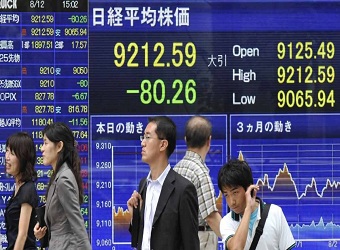Asia markets finished mixed on the final day of trading in March, as investors await two expected executive orders by President Donald Trump which will tackle trade deficit and tariff enforcement.
One of the executive order is expected to commission a report on trade practices that contribute to trade deficit, and the second will strive to implement better collection of anti-dumping and countervailing duties.
Trump’s expected meeting with Chinese President Xi Jinping will also be closely watched by markets.
Xi, along with his wife Peng Liyuan, is expected to be hosted by Trump and First Lady Melania Trump at the U.S. president’s Florida golf resort next Thursday and Friday.
But Trump said the meeting will be “a very difficult one” in a Thursday tweet and said that the U.S. could no longer tolerate massive trade deficits and job losses.
In China, the Shanghai composite closed up 12.36 points, or 0.39 percent, at 3,222.60 and Shenzhen composite added 6.89 points, or 0.34 percent, to 1,986.47. Meanwhile, Hong Kong’s Hang Seng index fell 0.71 percent.
The full-year earnings reports of Air China, China Eastern Airlines and China Southern Airlines all missed analyst expectations on Thursday, with their foreign exchange losses totaling 11.04 billion yuan ($1.6 billion). The yuan has depreciated 6.6 percent against the dollar last year.
Hong Kong-listed shares of Air China fell 0.95 percent, Shanghai-listed China Eastern Airlines was off 2.27 percent and China Southern Airlines dropped 1.59 percent.
China’s official March manufacturing Purchasing Managers’ Index (PMI) rose to 51.8 in March, compared to February’s 51.6. China services PMI was also stronger, up at 55.1, compared to last month’s reading of 54.2. The 50 point mark separates growth from contraction on a monthly basis.
Down Under, the ASX 200 wavered for most of the session and closed down 0.53 percent or 31.32 points at 5,864.9.
Japan’s Nikkei 225 closed down 153.96 points, or 0.81 percent, at 18,909.26, as the yen traded at 111.84 to the dollar at 3:03 p.m. HK/SIN, strengthening from an earlier low of 112.19.
Japan’s core consumer prices rose 0.2 percent in February year-on-year, marking the fastest growth in nearly two years. But household spending fell 3.8 percent in February from a year earlier, missing estimates for a 1.7 percent fall. Meanwhile, Japan’s February jobless rate declined to 2.8 percent, its lowest rate since June 1994, and marked an improvement in the labor market.
The atmosphere was tense among Toshiba shareholders at the extraordinary general meeting on Thursday after they agreed to split off its prized NAND flash memory unit, to cover its U.S. subsidiary’s multi-billion dollar losses. Toshiba shares closed up 5.78 percent.
In South Korea, the Kospi slipped 4.41 points, or 0.2 percent, to 2,160.23. The country’s February factory output fell 3.4 percent from the previous month, the worst in more than eight years.
A Reuters poll had expected industrial output for last month to be flat.
Meanwhile, a South Korean court approved a warrant to arrest ousted President Park Geun-hye, over accusations of bribery and abuse of power.
The dollar was stronger at 100.56 against a basket of currencies at 3:05 pm HK/SIN, higher compared to levels of around 99 earlier this week. The Australian dollar fetched $0.7658.
U.S. stocks finished higher on Thursdays, led by financials and energy stocks, after U.S. fourth-quarter gross domestic product was revised up to a growth of 2.1 percent year-on-year, higher than the initial estimate of 1.9 percent.
The Dow Jones industrial average closed up 0.33 percent at 20,728.49, the S&P 500 added 0.29 percent to finish at 2,368.06 and the Nasdaq composite rose 0.3 percent to post a record close at 5,91434.
During Asian trade, Brent crude slipped 0.23 percent to $52.84 a barrel and U.S. crude dipped 0.04 percent to $50.33.
Oil prices surged to their highest in three weeks on Thursday U.S. time after Kuwait Oil Minister Essam al-Marzouq said his country was in support of extending the OPEC production cut deal.
Source: CNBC


